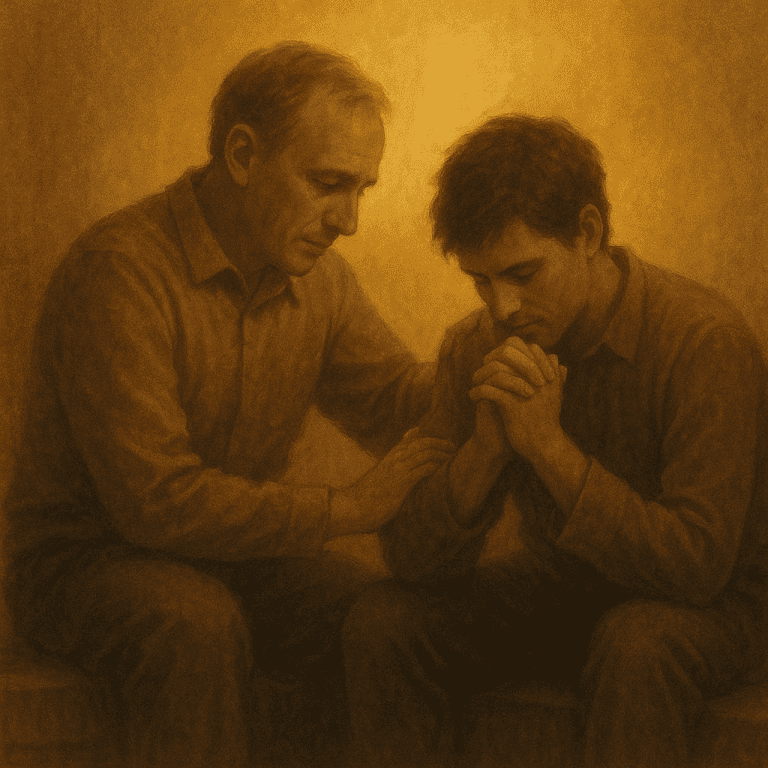Is Grace a License to Sin?
Is grace a license to sin? Some ask that question with genuine confusion. Others use it to dismiss the gospel entirely. But either way, the assumption behind it is dangerously flawed. Because the grace of God—though freely given—is never cheap. It cost the blood of Christ. And it doesn’t lower God’s standard. It fulfills it.

Yet the distortion remains. And not just outside the church. Some who claim Christ treat grace like a safety net for sins they have no intent to leave. After all, if God forgives, why fight so hard? Why repent again? Why obey when it’s easier to confess?
Because that’s not grace. That’s presumption.
Grace is not divine permission—it is divine power. It does not wink at sin. It puts sin to death. It doesn’t excuse the rebel. It raises the dead. When Paul asked, “Shall we continue in sin that grace may abound?” (Rom. 6:1), he wasn’t playing devil’s advocate. He was stomping the lie underfoot: “By no means!”
Biblical grace doesn’t leave you where it found you. It lifts you. It convicts you. And it keeps you.
Grace Doesn’t Lower the Standard—It Changes the Heart
But many still resist this. They hear the true gospel and recoil. If righteousness doesn’t come by law-keeping, they assume sin will reign unchecked. If justification is by faith, they fear obedience will fall away. They want rules. Grace offers renewal. But it’s not freedom to indulge the flesh—it’s freedom from the flesh.
The gospel does not produce lawlessness. It produces holiness.
The problem isn’t that grace leads to sin. The problem is that we’ve made grace passive. That it forgives without transforming. That it assures without discipling. That it comforts the sinner without calling him to die. But grace is not a soft pillow for the rebellious—it is the sword of the Spirit that cuts to the heart.
So again we ask: Is grace a license to sin? Not even close. The question reveals a heart that still misunderstands both the horror of sin and the glory of grace.
What Does the Bible Say About Grace and Sin?
That’s why the question—is grace a license to sin?—must be answered clearly and biblically, not sentimentally.
Grace trains. That’s the exact word Paul uses in Titus 2: “The grace of God has appeared… training us to renounce ungodliness and worldly passions, and to live self-controlled, upright, and godly lives.” Real grace has a curriculum. It reshapes the soul. It teaches what law never could: to love righteousness and hate evil.
And it’s not a gentle training. Hebrews 12 says God disciplines His children “so that we may share His holiness.” Grace doesn’t only comfort—it convicts. It doesn’t only cover—it corrects. It doesn’t let you drift—it pulls you back. The wounds of grace are the wounds of a faithful Father.
That’s why Paul warned the Galatians so sharply: “You were called to freedom… only do not use your freedom as an opportunity for the flesh” (Gal. 5:13). Grace frees you from condemnation—but not from obedience. It frees you into obedience. It frees you to serve by the Spirit—not to sin without consequence.
Paul didn’t write that as a cold theologian. He wrote as a wounded pastor. False teachers had crept in, twisting grace into license. And Paul didn’t hesitate: “If anyone is preaching a gospel contrary to the one you received, let him be accursed” (Gal. 1:9). That’s not a footnote. That’s a fire alarm.
Grace Isn’t a Loophole—It’s a Lifeline
But here’s the hard truth: many today still preach a grace that leaves sin untouched. A grace that asks nothing. A grace that changes nothing. They want Jesus as Savior—but not as Lord. They want pardon—but not power. And that is not the gospel.
James couldn’t be clearer: “Faith without works is dead” (James 2:26). Not optional. Not second-tier. Dead. That’s not a contradiction of the gospel—it’s the evidence of it. Grace that saves will bear fruit. Not perfectly. Not instantly. But undeniably.
So when someone asks again, “Is grace a license to sin?”, we must ask them a better question: What do you think grace is for? If you think it exists to excuse sin so you can stay in it, you don’t know grace. You’ve confused forgiveness with apathy. But grace is not apathy. It is God’s triumph over your rebellion.
If you’ve been born again, you will battle sin. But you’ll fight it. You won’t use grace as a cover—you’ll cling to it as a weapon. The cross won’t be your loophole—it will be your rescue. And when you fall, you’ll rise again. Not by grit. But by the Spirit who raised Christ from the dead and now dwells in you.
Grace doesn’t give you space to sin. It gives you strength to kill it.
Real Grace Always Produces Change
To the weary believer, still battling sin: grace is for you. Not to lull you into compromise—but to carry you into holiness. It’s not the hand that pats you while you drown. It’s the hand that pulls you from the water.
And to the one who has used grace to justify sin—repent. “Shall we continue in sin so that grace may abound?” Paul asks. And then he thunders, “By no means.” Grace does not excuse rebellion. It calls you to the cross. It breaks your pride. It cleanses. It restores. And it commands, “Go and sin no more.”
That was not just a word to a woman caught in adultery. That is the call to every believer who’s been shown mercy.
You don’t have to earn your way back. You have to come broken. And let grace not just pardon—but purify.
The Narrow Road Is Paved with Grace

So no—is grace a license to sin? Never. That lie does not come from Scripture. It comes from the flesh—still looking for a way to serve self while claiming to serve Christ. But grace doesn’t share the throne. It doesn’t decorate sin. It crucifies it.
Grace leads to repentance. It leads to holiness. It leads to obedience. And it gives the joy that sin promises but never delivers.
Grace does not widen the path. It opens the gate. And that gate leads to the narrow road—a road marked by surrender, sacrifice, and Spirit-filled joy. The gospel is not permission for the flesh. It is death to the old man—and resurrection to new life.
Because real grace doesn’t whisper, “You’re fine.” It declares, “You’re free.”
So if you’re still wondering, is grace a license to sin?, you may be asking the wrong question. The better one is this: Has grace done its work in you?
Because grace never leaves you the same.
It saves. It sanctifies. And it calls every redeemed sinner to walk in the light.
Want to know more about the grace of God in salvation? Check out this free resource!
Walt Roderick is a Christian writer who cares more about biblical clarity than online applause. He writes to strengthen believers and confront spiritual drift.






